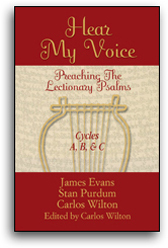SermonStudio
Thanksgiving Day
Preaching
Hear My Voice
Preaching The Lectionary Psalms for Cycles A, B, C
This brief psalm is among the most familiar in the psalter, but that is primarily because its verses have been excerpted in so many hymns and liturgical texts. There is something to be gained from looking at Psalm 100 in its entirety, and trying to recover its ancient liturgical context.


